Why Are People Boycotting McDonalds? Find Out Now!
Have You Ever Wondered Why Are People Boycotting McDonalds? The recent wave of boycotts against McDonald’s has raised critical questions about corporate responsibility and public perception amid geopolitical tensions. The fast-food giant finds itself at the center of controversy following allegations of supporting Israel amid the ongoing conflict in Gaza, which has sparked outrage and a global backlash.
As misinformation spreads, many consumers in the Middle East and beyond perceive the company’s actions as complicity in the crisis, leading to grassroots movements demanding accountability. The situation is further complicated by the actions of McDonald’s franchisees, including controversial gestures in support of military personnel and legal actions against activists advocating for Palestinian rights.
Table of Contents
The Root of the Allegations
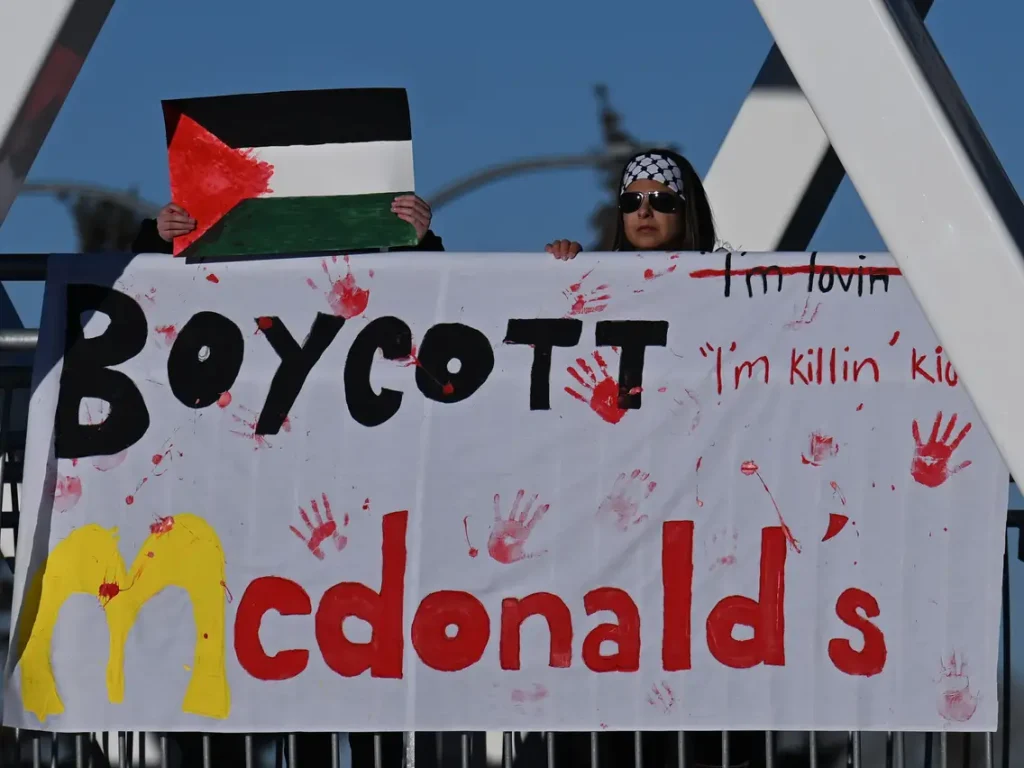
The root of the allegations against McDonald’s lies in its perceived support for Israel during the ongoing conflict in Gaza. The controversy ignited when McDonald’s franchise in Israel provided free meals to Israeli military personnel. This action was seen by many as endorsing the military’s operations in Gaza. Subsequently, social media buzz amplified these perceptions, with various groups accusing McDonald’s of taking sides.
Adding fuel to the fire, these acts were promoted online, further angering consumers. In response, grassroots movements have organized boycotts and protests, demanding accountability from the fast-food giant. The Palestinian BDS National Committee also endorsed a global boycott, escalating the situation. This complex web of actions and perceptions has significantly tarnished McDonald’s reputation, especially in Middle Eastern countries.
Some Other Reasons Behind People Boycotting McDonalds:
| Reason | Explanation |
| Labor Practices | Criticism over low wages, poor working conditions, and inadequate benefits for employees. |
| Environmental Impact | Accusations of contributing to deforestation, plastic waste, and unsustainable farming practices. |
| Animal Welfare | Concerns over unethical treatment of animals in the supply chain, including factory farming practices. |
| Health Concerns | The association of McDonald’s food with obesity, heart disease, and poor nutrition, particularly in children. |
| Cultural Impact | Viewed as promoting an unhealthy fast-food culture and threatening local culinary traditions. |
| Exploitation of Farmers | Claims that McDonald’s exploits small-scale farmers by paying low prices for ingredients. |
| Tax Avoidance | Accusations of McDonald’s engaging in tax avoidance strategies to minimize its financial contributions. |
| Political and Social Issues | Boycotts due to McDonald’s perceived stance or actions on political and social issues, including LGBTQ+ rights. |
| Employee Treatment During COVID-19 | Criticism for how McDonald’s handled worker safety, pay, and health during the COVID-19 pandemic. |
| Racial and Social Justice Movements | Some boycotts are in response to McDonald’s perceived lack of support for racial justice and inequality issues. |
Impact of Misinformation on McDonald’s Reputation
Misinformation has had a severe impact on McDonald’s reputation globally, especially in muslim-majority countries and the Middle East. False narratives circulating on social media have significantly altered public perception. These recent stories answer the question, “Why are people boycotting McDonald’s?” with incomplete or incorrect information.
Consequently, misinformation has fueled outrage and confusion, exacerbating the boycott movement. False claims about McDonald’s corporate stance on related topics like the BDS movement or Israel-Gaza ‘misinformation’ have overshadowed their actual policies. This misinformation spreads rapidly, amplifying consumer distrust and anger, particularly in fast food chain comparisons with brands like Burger King and Bud Light.
In the digital age, controlling the narrative becomes an arduous task. Misinformation not only harms reputation but also affects business operations. It sows doubt and leads to widespread backlash, making crisis management more complex. Countering these false narratives is crucial for a global brand like McDonald’s.
The Franchise-Based Business Model
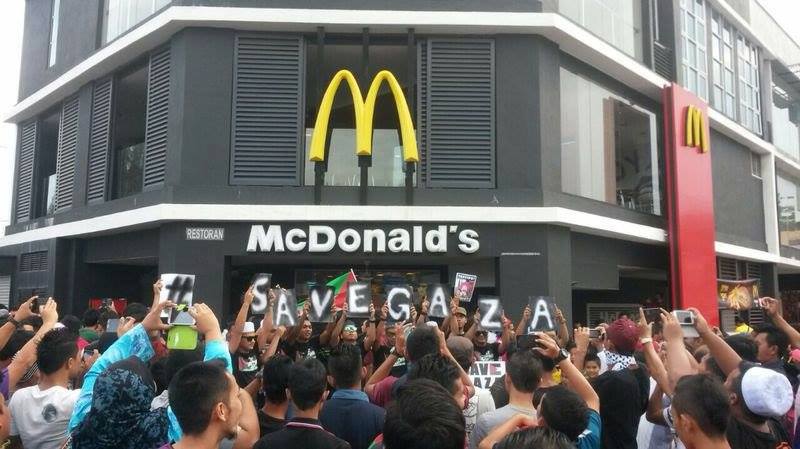
McDonald’s operates over 40,000 stores worldwide, most owned by local franchisees. This decentralized model allows for regional adaptation but can also lead to inconsistencies in corporate messaging. For example, actions taken by franchisees, such as providing free meals to military personnel, can be misconstrued as the corporation’s official stance.
This is why people are boycotting McDonald’s, as individual franchises’ decisions sometimes do not reflect the company’s overall policies. The complexity of the franchise system makes it challenging for McDonald’s to maintain a unified image. Local actions often get amplified on social media, creating a broader impact.
These inconsistencies are especially problematic during the fourth quarter, when the company’s market share is most scrutinized. This structure has contributed to the widespread allegations and subsequent boycotts, with comparisons drawn to why are people boycotting Starbucks and McDonald’s. The situation highlights the challenges of managing a global brand in politically sensitive times.
Social Media’s Role in Shaping Public Opinion
- Amplification of Controversial Actions:
Social media platforms have amplified the actions of McDonald’s franchises, spreading news of the Israeli franchise providing free meals to military personnel and creating viral content that fuels outrage.
- Hashtag Movements and Viral Campaigns:
Hashtags like #BoycottMcDonalds have gained traction, rallying support for the boycott and making it a trending topic worldwide, which puts additional pressure on the company to respond.
- Misinformation and Fake News:
The rapid spread of misinformation on platforms like Twitter and Facebook has compounded the issue, with false or exaggerated claims about McDonald’s corporate stance and actions contributing to the boycott momentum.
- Influence of Grassroots Movements:
Social media has empowered grassroots movements to organize and mobilize quickly, leading to widespread protests and calls for accountability, which are shared and amplified across networks.
- Corporate Responses and Public Perception:
McDonald’s statements and actions to clarify its position are also disseminated through social media. However, the speed and volume of user-generated content often overshadow these efforts, making it difficult to control the narrative.
The Role of the Palestinian BDS National Committee
The Palestinian BDS National Committee (BNC) has been instrumental in amplifying the boycott movement against McDonald’s. Central to their campaign is the question, “Why Are People Boycotting McDonalds?” The BNC’s endorsement of the boycott is driven by allegations of McDonald’s Israeli franchise supporting military actions.
By providing free meals to Israeli army personnel, the franchise is perceived as endorsing the ongoing conflict. The BNC has called for a global escalation of the boycott, urging McDonald’s to terminate its agreement with the Israeli franchisee. Their firm stance highlights the power of grassroots movements in holding corporations accountable. The BNC has galvanized support through social media and public statements, making the boycott a global issue. This reflects the growing influence of activist coalitions in shaping corporate behavior.
Responses from McDonald’s Outlets in Muslim-Majority Countries
- Kuwait: Clarifying Corporate Stance
McDonald’s outlets in Kuwait issued statements distancing themselves from the Israeli franchise’s actions, emphasizing their commitment to neutrality in geopolitical conflicts. They reassured customers that local operations are independently managed and not influenced by actions elsewhere.
- Malaysia: Legal Action and Public Reassurance
In Malaysia, McDonald’s faced significant backlash, leading to the franchise’s owner, Lionhorn Pte Ltd, filing an SLAPP against BDS Malaysia. Despite the legal battle, McDonald’s Malaysia reiterated its focus on community welfare and neutrality in the conflict.
- Pakistan: Emphasizing Independence
McDonald’s Pakistan took social media to clarify its independent operational structure. The franchise emphasized its lack of involvement in the actions of the Israeli franchise and reaffirmed its dedication to serving the local community without political bias.
- Indonesia: Community Engagement
Initiatives Indonesian McDonald’s outlets have ramped up community engagement initiatives to rebuild trust. They launched campaigns focusing on local charity and social programs, aiming to demonstrate their commitment to the well-being of their customers irrespective of global political tensions.
- Saudi Arabia: Direct Communication with Consumers
In Saudi Arabia, McDonald’s franchises have directly communicated with consumers through social media and traditional media channels. They addressed the misinformation, reiterating their independence from the Israeli franchise and ensuring customers of their apolitical stance.
Scrutiny of McDonald’s Franchise in Israel
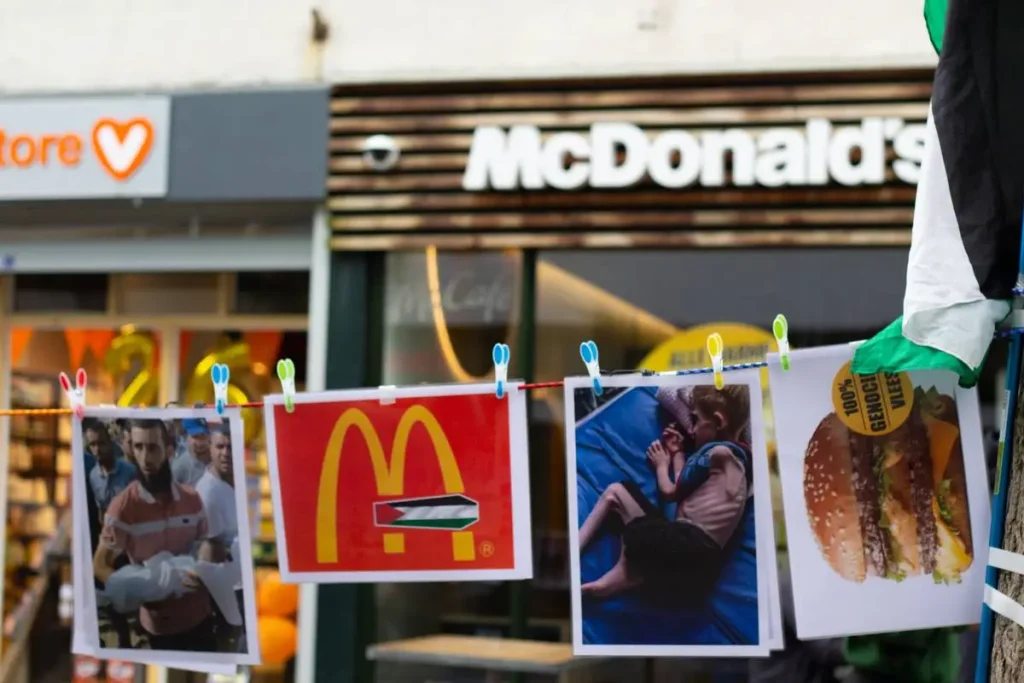
The scrutiny of McDonald’s franchises in Israel has intensified amid the ongoing war on Gaza. The Israeli franchise’s decision to provide free meals to military personnel sparked significant controversy. Many view this gesture as direct support for military actions. Consequently, it has become a focal point in the global boycott campaign. Social media platforms were flooded with calls to boycott McDonald’s, spreading the hashtag #BoycottMcDonalds.
These actions have raised critical questions about corporate responsibility and neutrality. People ask, “Why Are People Boycotting McDonalds?” The controversy surrounding the Israeli franchise’s actions has significantly damaged McDonald’s reputation, especially in the Middle East. The franchise’s decisions have led to widespread criticism and heightened tensions, complicating McDonald’s efforts to manage its global image and maintain customer trust.
Strategic Lawsuit Against Public Participation in Malaysia
McDonald’s Malaysia has taken a controversial step by initiating a Strategic Lawsuit Against Public Participation (SLAPP) against BDS Malaysia. The lawsuit, seeking over $1 million in damages, alleges defamation by BDS Malaysia. This legal action has sparked widespread debate and criticism. Many see it as an attempt to silence advocates of the Palestinian cause.
The lawsuit underscores the high stakes in the question, “why are people.boycotting mcdonald’s?” The SLAPP suit has intensified scrutiny of McDonald’s corporate ethics. Transitioning from public outrage to legal battles complicates the company’s public relations efforts. Critics argue that this move contradicts McDonald’s claims of neutrality. As the legal proceedings unfold, the company faces increasing pressure to balance business interests with ethical considerations.
International Responses and Legal Implications
- Support from the Malaysian Government:
The Malaysian government has shown strong support for South Africa’s application to the International Court of Justice (ICJ) against Israel, focusing on alleged violations of the Genocide Convention in Gaza
- Organization of Islamic Cooperation (OIC) Involvement:
The OIC has backed efforts to hold Israel accountable through international legal frameworks, stressing the importance of corporate adherence to human rights standards. U.N.
- Guiding Principles on Business and Human Rights:
Under the U.N. Guiding Principles, multinational corporations like McDonald’s can be held liable if their subsidiaries are implicated in severe human rights abuses, adding a layer of legal complexity.
- Criticism from International Law Scholars:
International law scholars have described the humanitarian crisis in Gaza as “apocalyptic,” amplifying calls for corporate responsibility and ethical business practices from global entities like McDonald’s.
- Potential Legal Ramifications for McDonald’s:
Failure to address these concerns could expose McDonald’s to legal actions and significant reputational damage, making corporate compliance with international human rights laws more critical than ever.
Calls for Escalation of the Global Boycott
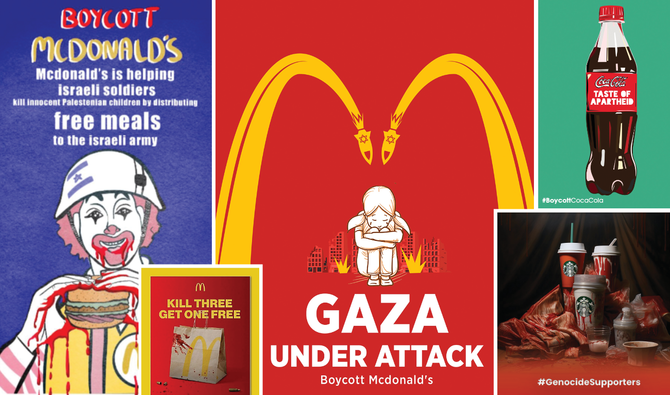
The Palestinian BDS National Committee has intensified its efforts, calling for a global escalation of the McDonald’s boycott. They urge people worldwide to amplify their voices and take action. This surge in activism aims to pressure McDonald’s Corporation to address the contentious issues surrounding its Israeli franchisee.
Protesters and activists have utilized social media to spread their message, asking Why people are boycotting McDonalds. This question resonates with many, igniting further support for the boycott. In response, demonstrations and online campaigns are gaining momentum. The BDS movement demands McDonald’s terminate its agreement with the Israeli franchisee and address ethical concerns. These calls for escalation reflect a broader movement toward corporate accountability. As the boycott gains traction, it underscores the power of collective action in influencing global brands.
The Growing Importance of Corporate Ethics
In today’s interconnected world, the growing importance of corporate ethics cannot be overstated. Consumers increasingly scrutinize the actions of multinational corporations, expecting them to uphold ethical standards. Social media has magnified this scrutiny, turning local actions into global controversies. Why Are People Boycotting McDonalds? This question highlights the demand for transparency and responsibility.
Companies must navigate complex geopolitical landscapes and maintain a neutral stance. Failing to do so can lead to significant reputational damage. For McDonald’s, this means addressing both the actions of its franchises and the misinformation circulating online. Ethical business practices are no longer optional; they are essential. Grassroots movements have shown their power in holding corporations accountable. Consequently, businesses must prioritize ethical considerations to sustain their global reputation and consumer trust.
Lessons for Multinational Corporations
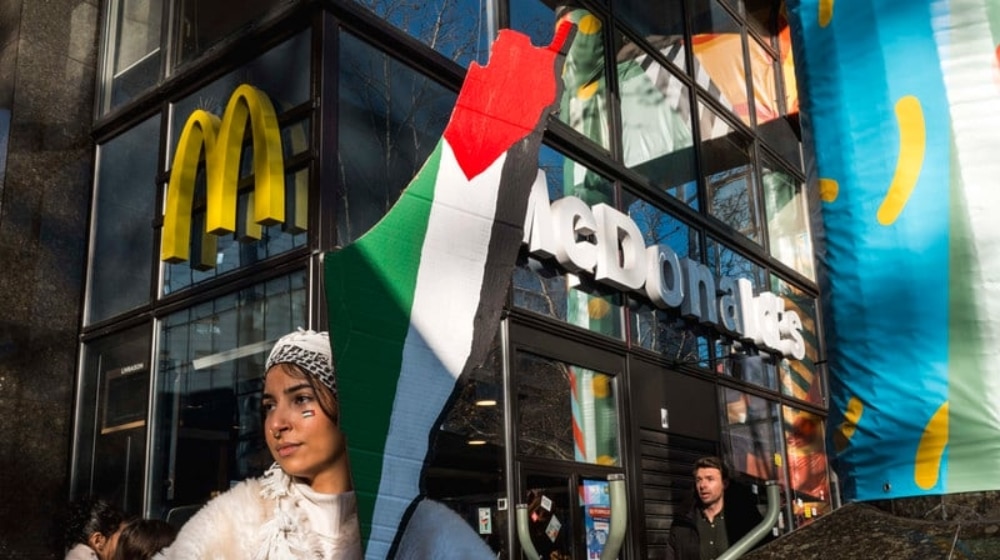
- Understand Local Sensitivities:
Multinational corporations must recognize and respect regional nuances. Actions by individual franchises can significantly impact perceptions, as seen with the question, “Why Are People Boycotting McDonalds?”
- Counter Misinformation Proactively:
Rapidly address and correct false narratives. Misinformation can exacerbate crises, making it crucial for companies to control the narrative and provide accurate information.
- Maintain Corporate Consistency:
A decentralized franchise model demands stringent guidelines to ensure uniformity in corporate messaging and ethical standards, minimizing the risk of misaligned actions.
- Engage with Grassroots Movements:
Actively listen and respond to grassroots movements. Understanding their concerns and addressing them transparently can mitigate backlash and foster trust.
- Strengthen Social Media Strategies:
Develop robust social media strategies to address controversies quickly. Effective use of these platforms can help manage public perception and counteract negative campaigns.
FAQs About Why Are People Boycotting McDonalds
Why are people boycotting McDonalds?
People are boycotting McDonald’s due to allegations of the company supporting Israel amid the Gaza conflict. The controversy primarily stems from McDonald’s Israel providing free meals to military personnel, which many see as endorsing the conflict.
How has misinformation impacted the boycott movement?
Misinformation has significantly fueled the boycott by spreading false narratives about McDonald’s corporate stance. Social media platforms have amplified these misleading stories, intensifying public outrage and complicating McDonald’s efforts to manage its reputation.
What is the role of the Palestinian BDS National Committee in the boycott?
The BDS National Committee has endorsed the global boycott of McDonald’s, urging the termination of the Israeli franchise agreement. They highlight the company’s perceived support for military actions in Gaza, mobilizing grassroots movements to demand corporate accountability.
How have McDonald’s franchises in Muslim-majority countries responded to the boycott?
Franchises in countries like Kuwait, Malaysia, and Pakistan have issued statements distancing themselves from the Israeli franchise’s actions. They emphasize their operational independence and commitment to neutrality, aiming to reassure their local customer bases.
Conclusion About Why Are People Boycotting McDonalds
The controversy surrounding McDonald’s amid the Gaza conflict highlights complex challenges for global corporations. The question, “Why Are People Boycotting McDonalds?” stems from a mix of perceived political stances and widespread misinformation. Social media has amplified these issues, complicating McDonald’s efforts to maintain a neutral image. The actions of franchisees, particularly in Israel, have intensified public scrutiny and backlash.
Multinational companies like McDonald’s must navigate these turbulent waters carefully. Balancing corporate ethics with business interests is crucial in today’s interconnected world. Grassroots movements demanding accountability and transparency have proven to be powerful forces. McDonald’s response to these calls will set a precedent for global brands’ management of geopolitical sensitivities. As the boycott continues, the company must address the concerns raised and strive to rebuild trust with its international customer base.





